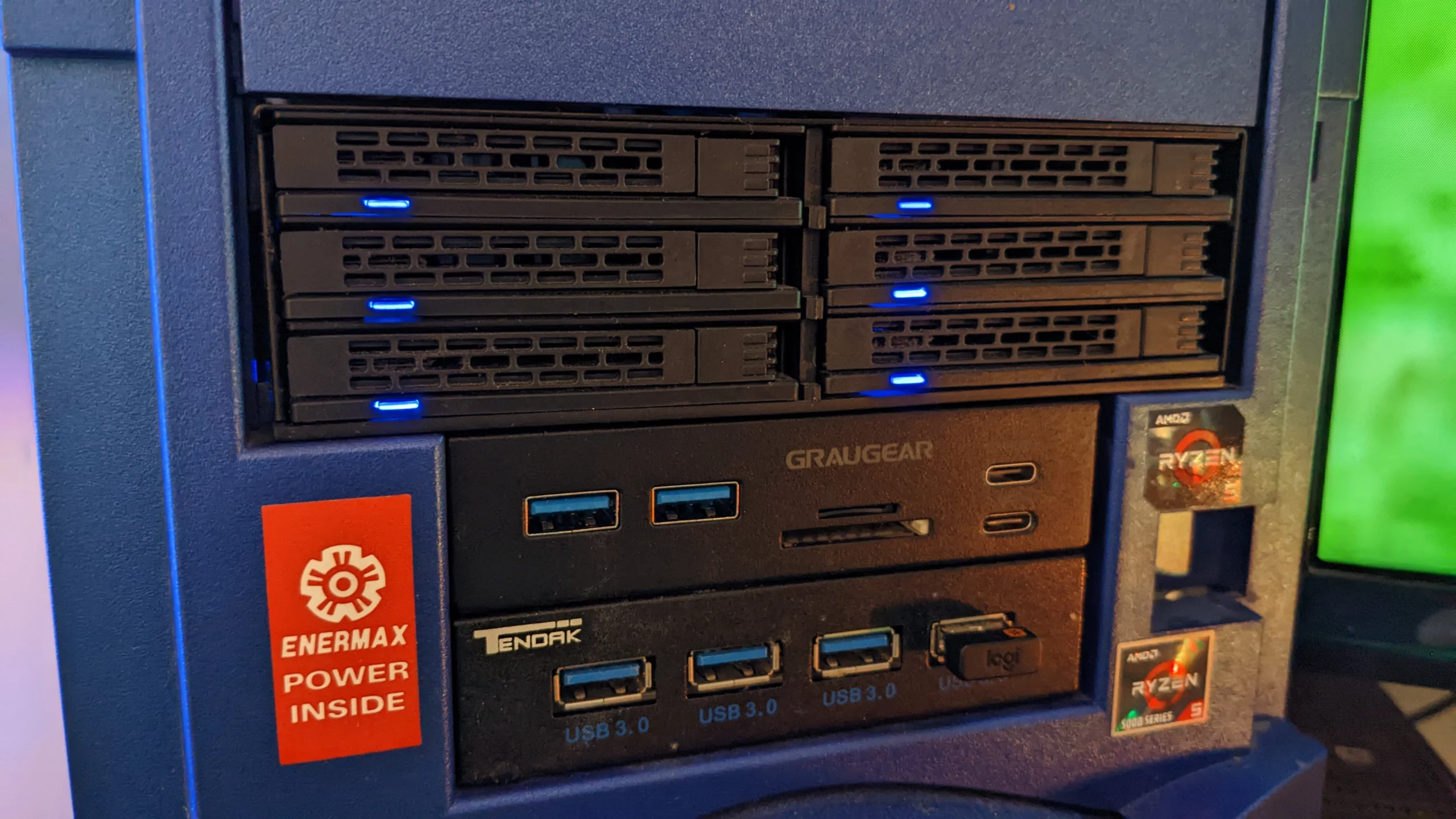My 6 Terabyte 4 drive RAID 5 array was starting to get tight on space. Upgrading the motherboard to a GIGABYTE X570 AORUS ELITE gave me 6 SATA ports so I could finally populate the the two empty bays in my 6 bay ICY Dock enclosure. I’m adding two Seagate BarraCuda 2TB 2.5 inch Internal Hard Drives to an existing 4 drive RAID 5 array using the same drives. Here’s how to add drives to a Linux RAID
List your drives
sudo fdisk -l bash
Disk /dev/nvme0n1: 465.76 GiB, 500107862016 bytes, 976773168 sectors
Disk model: Samsung SSD 970 EVO 500GB
Units: sectors of 1 * 512 = 512 bytes
Sector size (logical/physical): 512 bytes / 512 bytes
I/O size (minimum/optimal): 512 bytes / 512 bytes
Disklabel type: gpt
Disk identifier: 2FCD7A4E-17E5-4AB9-98B8-35096B48D597
Device Start End Sectors Size Type
/dev/nvme0n1p1 2048 1050623 1048576 512M EFI System
/dev/nvme0n1p2 1050624 976771071 975720448 465.3G Linux LVM
Disk /dev/sda: 1.82 TiB, 2000398934016 bytes, 3907029168 sectors
Disk model: ST2000LM015-2E81
Units: sectors of 1 * 512 = 512 bytes
Sector size (logical/physical): 512 bytes / 4096 bytes
I/O size (minimum/optimal): 4096 bytes / 4096 bytes
Disk /dev/sdb: 1.82 TiB, 2000398934016 bytes, 3907029168 sectors
Disk model: ST2000LM015-2E81
Units: sectors of 1 * 512 = 512 bytes
Sector size (logical/physical): 512 bytes / 4096 bytes
I/O size (minimum/optimal): 4096 bytes / 4096 bytes
Disk /dev/sdc: 1.82 TiB, 2000398934016 bytes, 3907029168 sectors
Disk model: ST2000LM015-2E81
Units: sectors of 1 * 512 = 512 bytes
Sector size (logical/physical): 512 bytes / 4096 bytes
I/O size (minimum/optimal): 4096 bytes / 4096 bytes
Disklabel type: gpt
Disk identifier: 443C6298-2A04-43C3-AF58-69AE4C7B2EF4
Device Start End Sectors Size Type
/dev/sdc1 2048 3907029134 3907027087 1.8T Linux RAID
Disk /dev/sdd: 1.82 TiB, 2000398934016 bytes, 3907029168 sectors
Disk model: ST2000LM015-2E81
Units: sectors of 1 * 512 = 512 bytes
Sector size (logical/physical): 512 bytes / 4096 bytes
I/O size (minimum/optimal): 4096 bytes / 4096 bytes
Disklabel type: gpt
Disk identifier: CE55305E-34EE-4C89-8004-425D3A104E2A
Device Start End Sectors Size Type
/dev/sdd1 2048 3907029134 3907027087 1.8T Linux RAID
Disk /dev/sde: 1.82 TiB, 2000398934016 bytes, 3907029168 sectors
Disk model: ST2000LM015-2E81
Units: sectors of 1 * 512 = 512 bytes
Sector size (logical/physical): 512 bytes / 4096 bytes
I/O size (minimum/optimal): 4096 bytes / 4096 bytes
Disklabel type: gpt
Disk identifier: D95B8806-7C60-4541-ABE0-2EF71C18C34B
Device Start End Sectors Size Type
/dev/sde1 2048 3907029134 3907027087 1.8T Linux RAID
Disk /dev/sdf: 1.82 TiB, 2000398934016 bytes, 3907029168 sectors
Disk model: ST2000LM015-2E81
Units: sectors of 1 * 512 = 512 bytes
Sector size (logical/physical): 512 bytes / 4096 bytes
I/O size (minimum/optimal): 4096 bytes / 4096 bytes
Disklabel type: gpt
Disk identifier: EFA00AD8-6DBB-4B16-9572-5736E88361DB
Device Start End Sectors Size Type
/dev/sdf1 2048 3907029134 3907027087 1.8T Linux RAID
Disk /dev/mapper/vgubuntu-root: 464.3 GiB, 498539167744 bytes, 973709312 sectors
Units: sectors of 1 * 512 = 512 bytes
Sector size (logical/physical): 512 bytes / 512 bytes
I/O size (minimum/optimal): 512 bytes / 512 bytes
Disk /dev/mapper/vgubuntu-swap_1: 980 MiB, 1027604480 bytes, 2007040 sectors
Units: sectors of 1 * 512 = 512 bytes
Sector size (logical/physical): 512 bytes / 512 bytes
I/O size (minimum/optimal): 512 bytes / 512 bytes
Disk /dev/md0: 5.46 TiB, 6000787587072 bytes, 11720288256 sectors
Units: sectors of 1 * 512 = 512 bytes
Sector size (logical/physical): 512 bytes / 4096 bytes
I/O size (minimum/optimal): 524288 bytes / 1572864 bytesAs you can see /dev/sda and /dev/sdb are empty so these are the drives we will be using. If you’re reusing drives that already have a partition this might be a little trickier to figure out
Label your new drives to match drives in array
sudo parted -s -a optimal /dev/sda mklabel gpt
sudo parted -s -a optimal /dev/sdb mklabel gptDump partition table from an existing array member to a new drive
sudo sfdisk -d /dev/sdc | sfdisk /dev/sda bash
Checking that no-one is using this disk right now ... OK
Disk /dev/sda: 1.82 TiB, 2000398934016 bytes, 3907029168 sectors
Disk model: ST2000LM015-2E81
Units: sectors of 1 * 512 = 512 bytes
Sector size (logical/physical): 512 bytes / 4096 bytes
I/O size (minimum/optimal): 4096 bytes / 4096 bytes
Disklabel type: gpt
Disk identifier: 0BC1639C-FBFD-4EBB-AF2E-47235065F95C
Old situation:
>>> Script header accepted.
>>> Script header accepted.
>>> Script header accepted.
>>> Script header accepted.
>>> Script header accepted.
>>> Script header accepted.
>>> Script header accepted.
>>> Created a new GPT disklabel (GUID: 443C6298-2A04-43C3-AF58-69AE4C7B2EF4).
/dev/sda1: Created a new partition 1 of type 'Linux RAID' and of size 1.8 TiB.
/dev/sda2: Done.
New situation:
Disklabel type: gpt
Disk identifier: 443C6298-2A04-43C3-AF58-69AE4C7B2EF4
Device Start End Sectors Size Type
/dev/sda1 2048 3907029134 3907027087 1.8T Linux RAID
The partition table has been altered.
Calling ioctl() to re-read partition table.
Re-reading the partition table failed.: Permission denied
The kernel still uses the old table. The new table will be used at the next reboot or after you run partprobe(8) or partx(8).
Syncing disks.
sudo sfdisk -d /dev/sdc | sfdisk /dev/sdb
Checking that no-one is using this disk right now ... OK
Disk /dev/sdb: 1.82 TiB, 2000398934016 bytes, 3907029168 sectors
Disk model: ST2000LM015-2E81
Units: sectors of 1 * 512 = 512 bytes
Sector size (logical/physical): 512 bytes / 4096 bytes
I/O size (minimum/optimal): 4096 bytes / 4096 bytes
Disklabel type: gpt
Disk identifier: B5DDD383-90DB-4375-917C-F0F8C2F6B47B
Old situation:
>>> Script header accepted.
>>> Script header accepted.
>>> Script header accepted.
>>> Script header accepted.
>>> Script header accepted.
>>> Script header accepted.
>>> Script header accepted.
>>> Created a new GPT disklabel (GUID: 443C6298-2A04-43C3-AF58-69AE4C7B2EF4).
/dev/sdb1: Created a new partition 1 of type 'Linux RAID' and of size 1.8 TiB.
/dev/sdb2: Done.
New situation:
Disklabel type: gpt
Disk identifier: 443C6298-2A04-43C3-AF58-69AE4C7B2EF4
Device Start End Sectors Size Type
/dev/sdb1 2048 3907029134 3907027087 1.8T Linux RAID
The partition table has been altered.
Calling ioctl() to re-read partition table.
Re-reading the partition table failed.: Permission denied
The kernel still uses the old table. The new table will be used at the next reboot or after you run partprobe(8) or partx(8).
Syncing disks.Enable the partition table on the new drive(s)
sudo partprobeCheck the details of your existing array
sudo mdadm --detail /dev/md0
/dev/md0:
Version : 1.2
Creation Time : Sun Jul 26 19:55:30 2020
Raid Level : raid5
Array Size : 5860144128 (5.46 TiB 6.00 TB)
Used Dev Size : 1953381376 (1862.89 GiB 2000.26 GB)
Raid Devices : 4
Total Devices : 4
Persistence : Superblock is persistent
Intent Bitmap : Internal
Update Time : Thu Oct 6 00:55:31 2022
State : clean
Active Devices : 4
Working Devices : 4
Failed Devices : 0
Spare Devices : 0
Layout : left-symmetric
Chunk Size : 512K
Consistency Policy : bitmap
Name : skynet:0
UUID : 81dd659c:69c9247e:7f0a404a:5a2db2f1
Events : 109863
Number Major Minor RaidDevice State
0 8 49 0 active sync /dev/sdd1
1 8 33 1 active sync /dev/sdc1
2 8 65 2 active sync /dev/sde1
4 8 81 3 active sync /dev/sdf1Add drives to a Linux RAID array
sudo mdadm --add /dev/md0 /dev/sda1 bash
mdadm: added /dev/sda1
sudo mdadm --add /dev/md0 /dev/sdb1 bash
mdadm: added /dev/sdb1
sudo mdadm --detail /dev/md0 bash
/dev/md0:
Version : 1.2
Creation Time : Sun Jul 26 19:55:30 2020
Raid Level : raid5
Array Size : 5860144128 (5.46 TiB 6.00 TB)
Used Dev Size : 1953381376 (1862.89 GiB 2000.26 GB)
Raid Devices : 4
Total Devices : 6
Persistence : Superblock is persistent
Intent Bitmap : Internal
Update Time : Thu Oct 6 00:56:40 2022
State : clean
Active Devices : 4
Working Devices : 6
Failed Devices : 0
Spare Devices : 2
Layout : left-symmetric
Chunk Size : 512K
Consistency Policy : bitmap
Name : skynet:0
UUID : 81dd659c:69c9247e:7f0a404a:5a2db2f1
Events : 109865
Number Major Minor RaidDevice State
0 8 49 0 active sync /dev/sdd1
1 8 33 1 active sync /dev/sdc1
2 8 65 2 active sync /dev/sde1
4 8 81 3 active sync /dev/sdf1
5 8 1 - spare /dev/sda1
6 8 17 - spare /dev/sdb1Notice the drives have been added as spares
Grow the array
sudo mdadm --grow /dev/md0 --raid-devices=6Watch the progress of the rebuild
sudo watch cat /proc/mdstatThis will take awhile (about 60 hours for me)

Resize the filesystem
Now that we have grown the “physical” drive, we still need to expand the filesystem so the OS can use the added storage
sudo resize2fs /dev/md0
resize2fs 1.46.5 (30-Dec-2021)
Filesystem at /dev/md0 is mounted on /mnt/md0; on-line resizing required
old_desc_blocks = 699, new_desc_blocks = 1165
The filesystem on /dev/md0 is now 2441726720 (4k) blocks long.


